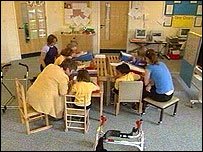Training given to teachers of children with special educational needs (SEN) or disabilities will be improved, Alan Johnson, education secretary, has said.
The pledge follows criticism from the Commons education select committee earlier this year that the education of these pupils was "not fit for purpose".
Mr Johnson also said he would set up a dyslexia trust, to pay for specialist training for school staff.
But disability groups said he had not addressed high levels of exclusion.
The package includes:
- a national programme of continuing professional development for teachers covering speech, language and communication needs including dyslexia and autism
- a dyslexia trust, involving private sponsorship - local authorities can bid for funding to pay for specialist teacher training
- strengthening the role and status of SEN co-ordinators, and developing nationally accredited training for new co-ordinators
Mr Johnson said: "Our policy is clear that every child with special educational needs must get a high quality education which meets their individual needs."
He added he did not believe it was the time to replace the current assessments and statements system, as the select committee had suggested.
He stressed that government policy remained that SEN children should go to mainstream schools, special schools or mainstream schools with provision for SEN children.
The Special Educational Consortium (SEC), an umbrella group for disability groups, said it welcomed the measures but the report fell short of addressing the high level of exclusion among SEN children.
David Willetts, shadow education secretary, said the report showed a "shocking lack of understanding of the heartache and pressures faced by parents with children with SEN".
He said the government needed to remove "the bias against special schools".
"It is no good paying lip service to the vital role that special schools play on the one hand, whilst closing them down against the wishes of parents on the other," he said.
In July, the cross-party education select committee called for stronger government guidelines for councils, to end a "postcode lottery" of provision.
The committee expressed concern that children with special educational needs were being "sidelined".
Scource: BBC


No comments:
Post a Comment